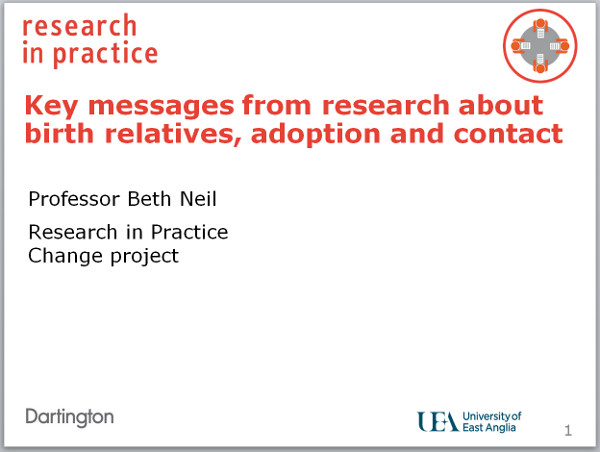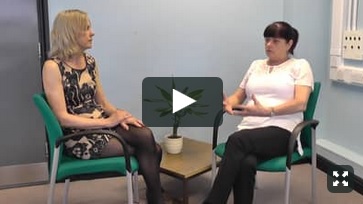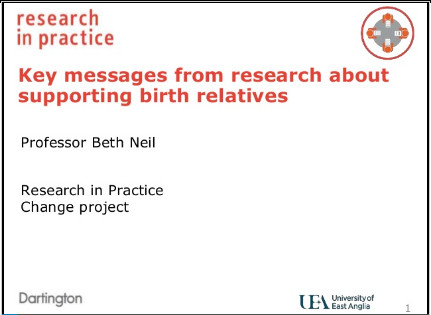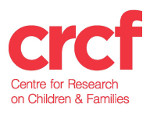Contents
This page contains a set of resources practitioners may find useful when working with and supporting birth relatives during planning and contact for their child.
Clips taken from the film:
- Film clip: Birth relative and adopter on meeting each other for the first time
- Film clip: Birth relatives discuss support needs
- Film clip: Families’ experience of direct contact
Practice briefings
Messages from research on how best to support and engage birth relatives when planning and supporting contact plans.
- Practice briefing: supporting birth parents with learning disabilities with contact
- Practice briefing: engaging birth relatives when making contact plans
- Practice briefing: supporting birth relatives with direct contact in the long-term
Practice resources
Resources practitioners may find helpful when working with birth relatives.
Research summaries
Audio and transcripts: birth parents’ voices
These audio clips and transcripts of birth parents talking about various aspects of adoption are intended for use in training and self directed learning to increase practitioners understanding of the needs and feelings of birth relatives. They can be used in the recruitment, assessment and training of adopters to explore the value of communicative openness and increase empathy with birth parents. The clips can also be used in supporting other birth parents to feel less isolated and begin to talk about their own experiences.
These audio recordings of birth parent voices were made by Prof Beth Neil and her research team at UEA as part of their “Helping Birth Families” research study. The birth parents who took part had worked alongside the research team as service user consultants to the project. Further details of the “Helping Birth Families” study can be found on the Adoption Research Initiative webpage.
-
- Audio Clip and transcript: Birth Parents Talking about Losing a Child to Adoption
- Audio Clip and transcript: Birth Parents Talking about the Adoption Process
- Audio Clip and transcript: Birth Parents Talking about Living with Adoption in the Longer Term
- Audio Clip and transcript: Birth Parents Talking About Finding it Hard to Obtain Support
- Audio Clip and transcript: Birth Parents Talking About the Benefits of Support
Resources for Birth Relatives
Links to additional resources
The Family Rights Group provides independent advice and information to families involved in child protection and care proceedings including those whose children are adopted.
Adoption: what does it mean for birth parents?
This includes advice about contact in adoption
Additional information on supporting parents with learning disabilities is available here
https://www.bestbeginnings.org.uk/parents-with-learning-disabilities
BAAF produces a number of leaflets for birth parents
We both had the same goal in mind. An adoptive mother and a birth grandmother discuss their experience of contact.
Clips taken from the longer film version are below, where a birth relative and adopter discuss specific issues.
Download the notes for this film PDF (328KB)
Birth relative and adopter on meeting each other for the first time
In this clip a birth grandparent and an adoptive mother discuss the experience of meeting each other. The grandmother talks about her hopes and concerns with the adoption process and how meeting the adoptive family helped her.
Birth relatives discuss support needs
A birth grandmother discusses her feelings on the adoption of her grandson and support needs for birth families.
Families’ experience of direct contact
An adoptive mother and birth grandmother discuss their experience of direct contact and the practical aspects of meeting.
 Download the slides Supporting Birth Relatives (336kB) Powerpoint .PPTX file slide presentation with trainers notes.
Download the slides Supporting Birth Relatives (336kB) Powerpoint .PPTX file slide presentation with trainers notes.
Download the Slide presentation with trainer’s notes: Birth parents’ and adopters’ views of contact (953 kB) PDF version.
Practice briefing: supporting birth parents with learning disabilities with contact
- Birth parents with learning disabilities experience the same feelings of loss, rage, sadness, confusion, jealousy, relief and joy at seeing their children as other parents do
Understanding the challenges
- Parents with learning disabilities are disproportionately likely to lose their children to adoption. They may lack support and suffer additional stigma and bullying in the community
- They may find these feelings harder to talk about and find contact arrangements harder to understand
- Parents sometimes agree with what you have said even if they don’t really understand it because they are embarrassed to ask you to explain. They can find it hard to remember information or understand abstract explanations. They may tend to concrete, literal thinking
- Parents with learning disabilities may find it hard to access post-adoption support that meets their particular needs.
- They may need extra help to understand and respond to their children as they grow up, especially when they do not see them very often
- Contact can be positive for adopted children, helping them to understand their identity and history and the reasons why they were adopted
- Support can help contact to work well
What practitioners can do to help
- Respect and value the role that learning disabled parents can play in adopted children’s lives
- Model polite, patient communication and appreciation of all kinds of achievements (baking a cake as well as passing an exam)
- Make sure that you understand the parent’s particular communication needs and share this information with the post-adoption support service, the contact supervisor and the adoptive parents
- Work with learning disabilities services and help them understand the importance of contact
- Use simple language in conversation, letters and written agreements
- Use short words, short sentences and short paragraphs
- Set out information clearly on the page and avoid jargon
- Don’t use metaphors, sayings or similes
- Use simple pictures to support explanations
- Repeat explanations more than once
- Check out that you have explained properly by asking the parent to give you the explanation back in their own words
- Remind parents about appointments
- Don’t just tell a birth parent how to do something (like play with a baby), show them
- Take an active, supportive role during contact. Tell birth parents what they are doing right, point out when the child responds well to them, help them change what they do as the child develops
- Encourage adoptive parents to help their child understand the birth parent’s difficulties and value their positive qualities as they grow up.
Practice briefing: engaging with birth relatives when making contact plans
The importance of birth relatives in the child’s life
- Birth families are important to most adopted children as they grow up, even if they have no conscious memories of living with them
- Continued contact of some kind is a unique resource for many adopted children, helping them to understand their own history, make sense of their identity and feel wanted
Understanding birth relatives needs and wishes
- Many birth relatives are acutely vulnerable with complex difficulties, in need of support in their own right. Parents may go on to have more children. Offering positive support at the time of the final hearing is an investment in the future
- Many birth families lives are in crisis at the time of care proceedings; they may be angry, frightened or distraught. Relatives can struggle to think straight or manage their behaviour. The kinds of problems that led to the child’s removal may get worse at this time
- The process of care proceedings is very hard for families to understand. We all find it more difficult to absorb information when we are angry, anxious or afraid
- Many parents find it hard to turn up to planned meetings or appointments at this time
- Fathers and black and minority ethnic parents find it particularly hard to access support
- Parents often suffer abuse and even violence in the aftermath of the removal of their children. They may be shunned by friends and family
- It is hard for families in care proceedings to work positively with child care social workers because of the adversarial nature of proceedings
- Support from independent agencies is highly valued; birth families want someone non-judgmental to talk to who is not involved in making decisions about their child
- Providing support with contact makes it more likely to get started well
- Relatives value practical support at this time and may feel able to accept this before emotional support
What practitioners can do to support birth relatives
- Explain and then explain again, adjusting the language used
- Keep visiting and phoning parents and relatives even if they miss appointments
- Offer practical help such as lifts to meetings or support letter writing if you can
- Help to build links between relatives and the adoption team
- Encourage families to make use of independent support services – make sure that other professionals (such as contact supervisors or children’s guardians) know about the help that is available – people may be more willing to listen to them
- Make sure that support services are accessible, well publicised and that families can self-refer
- Focus on the long term, it may take time for a parent or relative to accept help from support services or begin to recover from the impact of the court’s decision
- Don’t make final contact plans based on relatives’ responses at the time of final hearing; you may need to explain to the court that such plans can only be provisional
Practice briefing: supporting birth relatives with direct contact in the long-term
- Meeting up with or contacting your child/relative and their new family is a strange situation for which there are no established social rules
- Contact visits in particular are highly personal but take place between virtual strangers often in impersonal circumstances with no chance for adults to talk away from the child
Understanding birth relative’s feelings
- Birth relatives may feel a mixture of emotions around contact including renewed loss and grief, rage, jealousy, resentment, shame, guilt, relief, reassurance and joy
- It can be very hard to hear your child/relative call someone else ‘Dad’, go to a stranger for comfort, speak in a different accent or talk about experiences you cannot afford to provide
- Birth relatives often feel unsure of the rules of the situation, anxious that if they get things wrong contact may be withdrawn
- It can be hard to relate to a child that you no longer know much about
- Saying goodbye after direct contact is difficult, especially if birth relatives have to go home alone
- Birth relatives often worry about what will happen when their child turns 18 or how to answer difficult questions about why they were adopted
What practitioners can do to help
- Value the role of birth families in the lives of adopted children and recognise the difference that support can make to contact
- Focus on promoting good relationships between the adults involved, so that the child feels reassured
- Support birth relatives and manage boundaries if necessary so that adopters are free to support the child
- Acknowledge the inherent power imbalance; adoptive parents need to feel in control of the situation for the benefit of the child, but also share some of that control with birth relatives
- Help birth relatives understand how contact can help the child
- Make contact with birth relatives before and after visits to check out how they are feeling; recognise the strong emotions contact arouses, ask about hopes and fears, help them think about how their child may feel or act and ask about who will support them after the visit
- Offer post-adoption support services if these are not in place along with practical support with transport and venues, etc
- Provide opportunities for an exchange of information between birth relatives and adoptive parents so that news can be shared outside of visits (eg. birth mother is pregnant, child now wears glasses, adoptive parents have divorced)
- Attend contact in an active, supportive rather than supervisory role – helping to ease conversations, play and goodbyes
- Be clear about roles and expectations: who is called Mummy? Are kisses and cuddles OK? Who takes the child to the loo? Tells them off? Brings sandwiches? Is it OK to: ask questions? Bring a present? Share good news? Talk about problems or worries?
- Keep reviewing contact as circumstances change
- Help birth relatives to think about answering children’s questions and to prepare for adolescence
- Talk about social media contact before it happens
Birth Parents’ Voices
These audio clips and transcripts of birth relatives talking about various aspects of adoption are intended for use in training and self directed learning to increase practitioners understanding of the needs and feelings of birth relatives. They can be used in the recruitment, assessment and training of adopters to explore the value of communicative openness and increase empathy with birth parents. The clips can also be used in supporting other birth parents to feel less isolated and begin to talk about their own experiences.
These audio recordings of birth parent voices were made by Prof Beth Neil and her research team at UEA as part of their “Helping Birth Families” research study. The birth parents who took part had worked alongside the research team as service user consultants to the project. Further details of the “Helping Birth Families” study can be found on the Adoption Research Initiative webpage.
- Audio Clip: Birth Parents Talking about Losing a Child to Adoption
- Transcript: Birth Parents Talking about Losing a Child to Adoption
- Audio Clip: Birth Parents Talking about the Adoption Process
- Transcript of Birth Parents Talking about the Adoption Process
- Audio Clip: Birth Parents Talking about Living with Adoption in the Longer Term
- Transcript: Birth Parents Talking about Living with Adoption in the Longer Term
- Audio Clip: Birth Parents Talking About Finding it Hard to Obtain Support
- Transcript: Birth Parents Talking About Finding it Hard to Obtain Support
- Audio Clip: Birth Parents Talking About the Benefits of Support
- Transcript: Birth Parents Talking About the Benefits of Support
The series of audio clips can also be access through the Adoption Research initiative website







